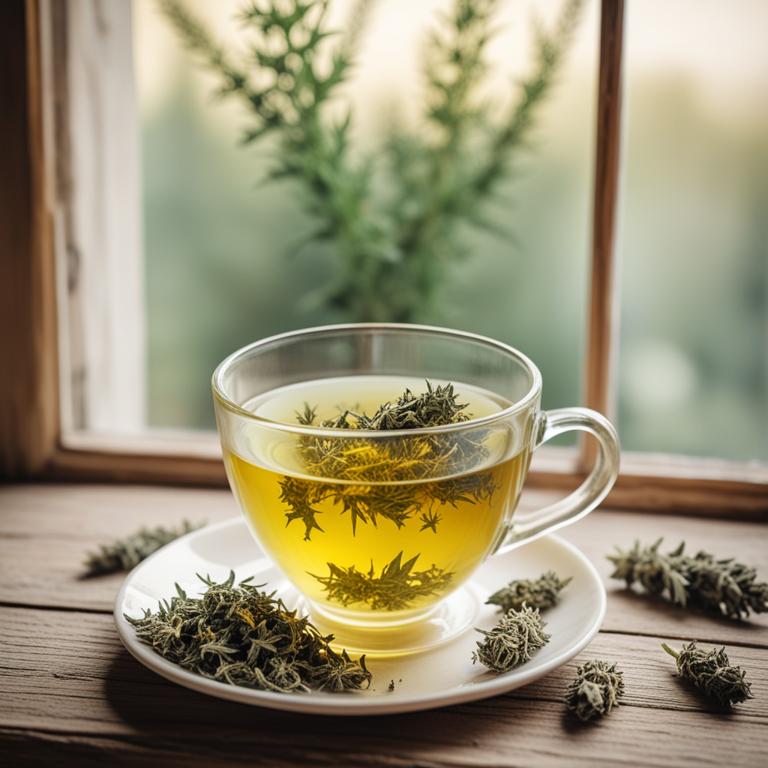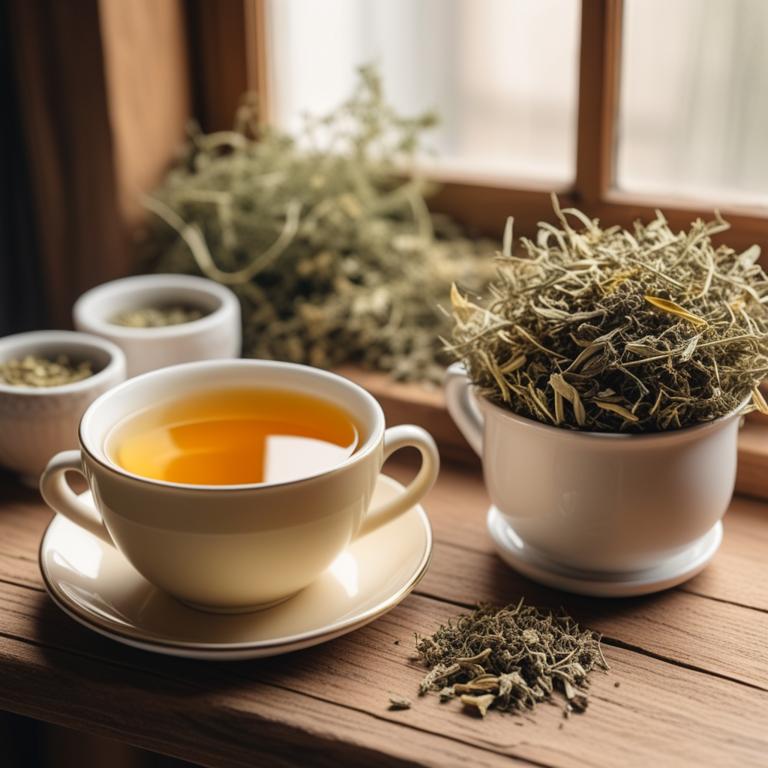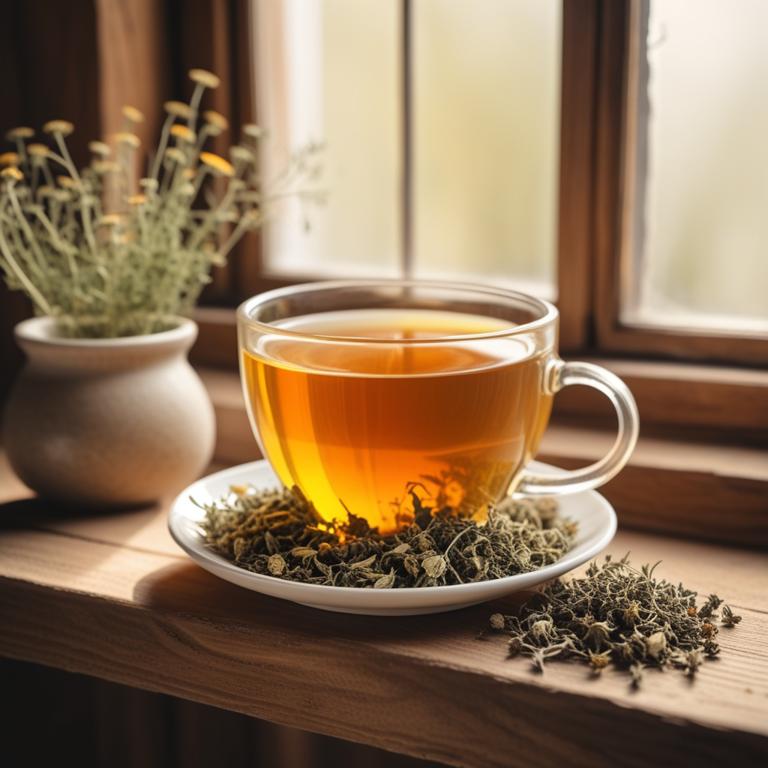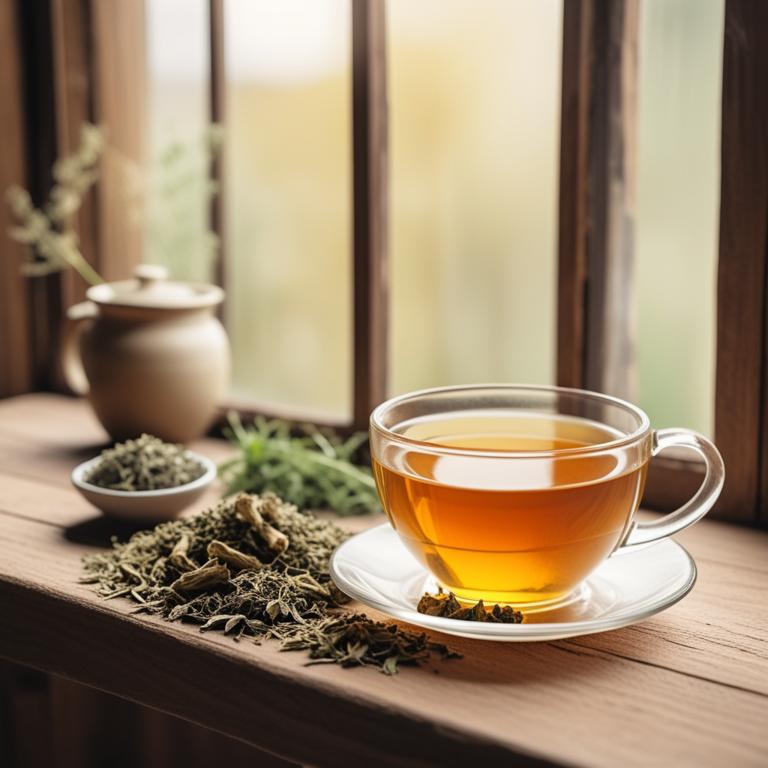10 Herbal Teas For Flatulence

Herbal teas are a natural and effective way to relieve flatulence.
When you eat, your body breaks down the food in your digestive system. Sometimes, the food can be difficult to digest and creates gas. This gas builds up and causes discomfort, bloating, and flatulence. Herbal teas like ginger (Zingiber officinale), fennel (Foeniculum vulgare), and licorice root (Glycyrrhiza glabra) contain compounds that help ease digestion and reduce gas. Ginger tea, for example, contains a compound called gingerol, which has anti-inflammatory properties that can help soothe the digestive system and reduce inflammation.
Fennel tea contains a compound called anethole, which helps to relax the muscles in the digestive tract and improve digestion. Licorice root tea contains a compound called glycyrrhizin, which helps to reduce inflammation and soothe the mucous membranes in the digestive tract. When you drink these teas, the compounds are absorbed into your system and help to ease digestion, reducing the amount of gas produced and the discomfort that comes with it. This can bring a lot of relief to people who experience frequent or severe flatulence. By reducing bloating and discomfort, you can feel more comfortable and confident in your daily life.
You can enjoy your favorite foods without worrying about the aftermath.
- 1. Zingiber officinale
- 2. Foeniculum vulgare
- 3. Glycyrrhiza glabra
- 4. Mentha x piperita
- 5. Cinnamomum verum
- 6. Anethum graveolens
- 7. Curcuma longa
- 8. Peumus boldus
- 9. Cuminum cyminum
- 10. Artemisia absinthium
1. Zingiber officinale

Zingiber officinale teas contains bioactive constituents such as gingerols and shogaols, which have anti-inflammatory and digestive properties.
These compounds help reduce inflammation in the digestive tract and relax the muscles in the intestines, allowing gas to pass through more easily. The anti-inflammatory properties of gingerols and shogaols also help reduce the irritation and inflammation that can cause flatulence. Additionally, ginger has a natural carminative effect, which means it helps to release trapped gas from the digestive system.
By reducing inflammation and promoting the release of gas, Zingiber officinale teas can help alleviate flatulence and promote a healthier digestive system.
- Gather ingredients: 1 tablespoon of fresh or dried Zingiber officinale root, a cup of water, and a strainer.
- Cut the Zingiber officinale root into small pieces.
- Boil the cup of water in a pot.
- Add the cut Zingiber officinale root to the boiling water and let it steep for 5-7 minutes.
- Strain the tea and drink it while it's hot to help with flatulence.
Zingiber Officinale Tea on Amazon
FGO Organic Ginger Tea, 100 Count, Eco-Conscious Tea Bags, Caffeine Free, Packaging May Vary (Pack of 1)
Disclaimer: We earn a commission if you click this link and make a purchase at no additional cost to you.
2. Foeniculum vulgare

Foeniculum vulgare teas contains the bioactive constituents fenchone, anethole, and limonene, which are responsible for its medicinal properties.
These compounds have a carminative effect, which helps to reduce gas and alleviate flatulence by relaxing the muscles in the digestive tract and reducing inflammation. Anethole, in particular, has a unique property that inhibits the production of gas-producing bacteria in the gut, further contributing to its carminative effects. Fenchone, on the other hand, has a direct effect on the muscles in the digestive tract, helping to ease cramps and discomfort associated with flatulence.
By reducing inflammation and inhibiting gas production, Foeniculum vulgare teas helps to provide relief from flatulence.
- Boil 1 cup of water in a pot.
- Add 2-3 teaspoons of dried Foeniculum vulgare seeds to the boiling water.
- Reduce heat and let it simmer for 5-7 minutes.
- Strain the tea into a cup using a tea strainer or a piece of cheesecloth.
- Drink the tea when it's warm, and repeat as needed.
3. Glycyrrhiza glabra

Glycyrrhiza glabra teas contains compounds like glycyrrhizin, flavonoids, and phenolic acids.
These constituents help to relax the muscles in the digestive tract, making it easier for gas to pass through. Glycyrrhizin, in particular, has anti-inflammatory properties that can reduce swelling and irritation in the gut, allowing for smoother digestion. The flavonoids and phenolic acids in Glycyrrhiza glabra teas also have antioxidant properties that can help protect the digestive system from damage caused by free radicals.
As a result, regular consumption of Glycyrrhiza glabra teas may help alleviate symptoms of flatulence.
- Gather 1 cup of fresh or dried Glycyrrhiza glabra roots.
- Cut the roots into small pieces and place them in a large bowl.
- Add 2 cups of boiling water to the bowl and let it steep for 5-7 minutes.
- Strain the liquid and add 1 tablespoon of honey (optional) to taste.
- Drink 1 cup of the tea 2-3 times a day to help with flatulence.
4. Mentha x piperita

Mentha x piperita teas contains a compound called menthol, a key active constituent that helps alleviate flatulence.
Menthol has a stimulating effect on digestion and improves the functioning of the stomach, intestines, and other digestive organs. Another important compound found in Mentha x piperita teas is menthone, which has a direct impact on reducing gas and bloating in the digestive system. The essential oils present in this tea, such as limonene and beta-pinene, also contribute to its carminative properties, helping to break down gas and reduce discomfort.
Regular consumption of Mentha x piperita teas may help regulate bowel movements and prevent the accumulation of gas that leads to flatulence.
- Gather 1 cup of fresh peppermint leaves (Mentha x piperita) or 1 teaspoon of dried peppermint leaves.
- Heat 1 cup of water in a pot until it boils.
- Remove the pot from heat and add the peppermint leaves.
- Let the mixture steep for 5-7 minutes, then strain the tea into a cup.
- Drink 1 cup of the peppermint tea after meals to help with flatulence.
5. Cinnamomum verum

Cinnamomum verum teas contains active constituents like cinnamaldehyde, cinnamic acid, and linalool.
These compounds have carminative properties, which help to reduce gas and alleviate flatulence. Cinnamaldehyde, in particular, has been shown to inhibit the growth of certain bacteria in the gut that can contribute to gas buildup. The anti-inflammatory properties of cinnamaldehyde and linalool may also help to soothe the digestive tract and reduce inflammation that can lead to bloating.
By reducing the growth of gas-producing bacteria and soothing the digestive tract, Cinnamomum verum teas may help to alleviate flatulence and provide relief from uncomfortable digestive symptoms.
- Gather 1 teaspoon of Cinnamomum verum powder and 1 cup of boiling water.
- Add 1 teaspoon of honey to the boiling water and stir well.
- Add the Cinnamomum verum powder to the honey-water mixture and stir gently.
- Let the mixture simmer for 5-7 minutes to release its flavors and oils.
- Strain the tea and drink it warm to help alleviate flatulence.
6. Anethum graveolens

Anethum graveolens teas contains the bioactive compounds dill apigenin, dill eugenol, and limonene.
These compounds have anti-inflammatory and carminative properties, which help to reduce gas and bloating in the digestive system. Dill apigenin, in particular, has been shown to relax the muscles in the digestive tract, allowing gas to pass through more easily. The limonene in dill tea also has a calming effect on the stomach, reducing inflammation and spasms that can contribute to flatulence.
By reducing inflammation and relaxing the digestive muscles, Anethum graveolens tea helps to alleviate symptoms of flatulence and promote a healthy digestive system.
- Gather 1 tablespoon of dried Anethum graveolens (dill weed) and 1 cup of boiling water.
- Measure 1 cup of boiling water and pour it into a cup or teapot.
- Add 1 tablespoon of dried Anethum graveolens to the boiling water.
- Steep the mixture for 5-7 minutes, then strain the liquid.
- Drink the tea 2-3 times a day to help with flatulence.
7. Curcuma longa

Curcuma longa teas contains a compound called curcumin, which is a powerful antioxidant and anti-inflammatory agent.
Curcumin helps to reduce inflammation in the digestive tract, which can cause flatulence. The tea also contains other bioactive compounds like demethoxycurcumin and bisdemethoxycurcumin, which have been shown to have anti-inflammatory properties. These compounds work together to help reduce gas and bloating by inhibiting the production of gas-producing enzymes in the gut.
By reducing inflammation and gas production, Curcuma longa teas can help alleviate symptoms of flatulence and promote a healthier digestive system.
- Get 1 cup of water and bring it to a boil.
- Add 1 teaspoon of dried Curcuma longa powder to the boiling water.
- Reduce heat to low and let it simmer for 5-7 minutes.
- Strain the tea into a cup using a fine-mesh sieve or cheesecloth.
- Drink the tea 2-3 times a day, as needed, to help with flatulence.
8. Peumus boldus

Peumus boldus teas contains a unique combination of bioactive compounds that make it effective in reducing flatulence.
The main compounds responsible for this property are boldine, scopoletin, and sesquiterpenes. These compounds have anti-inflammatory and antioxidant properties that help soothe the digestive system and reduce the production of gas in the intestines. The sesquiterpenes also have a calming effect on the muscles in the digestive tract, which can help slow down the movement of food and reduce the likelihood of gas buildup.
By reducing inflammation and slowing down digestion, Peumus boldus teas can help alleviate symptoms of flatulence and promote a more comfortable digestive experience.
- Gather 1 teaspoon of dried Peumus boldus leaves and a cup of boiling water.
- Steep the leaves in the boiling water for 5-7 minutes.
- Strain the mixture and discard the leaves.
- Drink the tea 30 minutes before meal to help with digestion.
- Drink 1-2 cups of the tea per day as needed to help with flatulence.
9. Cuminum cyminum

Cuminum cyminum teas contains a compound called cuminaldehyde, which is a natural carminative.
Carminative means it helps to relieve gas and bloating. Cuminaldehyde also contains other compounds like limonene and linalool, which have anti-inflammatory properties that can help soothe the digestive system. These compounds work together to ease digestive discomfort and reduce gas production.
As a result, Cuminum cyminum teas can help alleviate flatulence and promote a healthier gut.
- Boil 1 cup of water in a pot.
- Add 1 tablespoon of Cuminum cyminum seeds to the water.
- Reduce heat and let it simmer for 5 minutes.
- Strain the tea into a cup using a fine mesh sieve.
- Drink the tea when it's warm, 2-3 times a day as needed.
10. Artemisia absinthium

Artemisia absinthium teas contains thujone, bornyl acetate, and camphor, which have anti-inflammatory properties.
These compounds help reduce inflammation in the digestive system, making it a good treatment for flatulence. The anti-inflammatory properties of thujone and camphor also help soothe the digestive tract, reducing irritation and discomfort. Bornyl acetate has a calming effect on the muscles in the digestive system, which can help alleviate cramps and spasms associated with flatulence.
By reducing inflammation and soothing the digestive tract, Artemisia absinthium teas can help alleviate symptoms of flatulence.
- Gather 1 tablespoon of dried Artemisia absinthium leaves and flowers.
- Boil 1 cup of water in a teapot or a cup.
- Add the dried leaves and flowers to the boiling water and let it steep for 5-7 minutes.
- Strain the tea into another cup and discard the solids.
- Drink the tea as needed to help with flatulence, but do not exceed 1 cup per day.